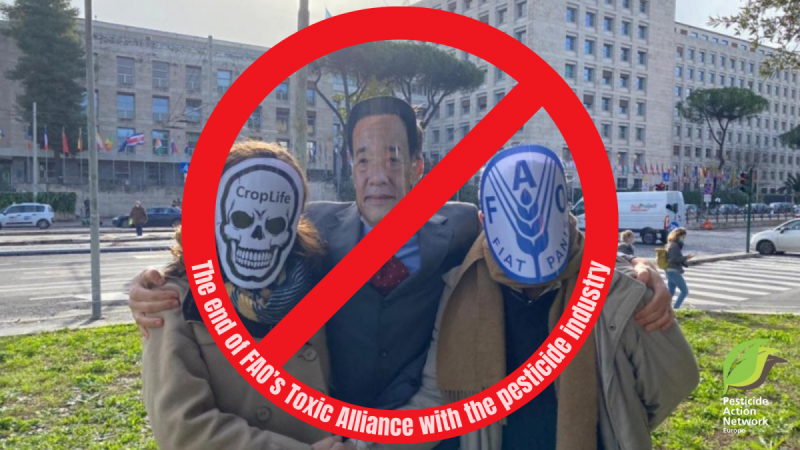The three-year controversial partnership between the UN Food and Agriculture Organization (FAO) and pesticide lobby group CropLife International has finally ended. Small farmers and campaigners welcome this as a milestone toward a healthier future for citizens and farm workers all around the world and for the environment.
During these three years, PAN Europe and Asia Pacific, together with members, sister organisations, civil society and Indigenous People organisations, sent letters and organised protests asking FAO to put an end to this toxic alliance. At some point, we asked the EU and Member States to suspend payments to the FAO.
A petition with 187,000 signatures from over 107 countries was sent to Director-General Qu Dongyu of the United Nations Food and Agriculture Organization (FAO), demanding that the FAO end its partnership with pesticide lobby group CropLife International.
Now the FAO has decided not to renew the alliance. “If you care about food, health and environment you can’t team up with the pesticide industry. That is like a health institution making an alliance with the tobacco industry,” says Martin Dermine, executive director of PAN Europe. PAN Asia Pacific (PANAP) Ilang-Ilang Quijano, co-coordinator of the campaign, adds: “This is a victory for farmers, farmworkers, and rural communities most affected by pesticide harms.”
What comes next?
The next step for the FAO should be to deliver on its commitments in the new Global Framework on Chemicals. It should lead the work of the Global Alliance to end the use of Highly Hazardous Pesticides.
“The FAO has a golden opportunity to show that it will make substantial progress. The first step is phasing out the most Highly Hazardous Pesticides worldwide. This while supporting the transition towards sustainable, resilient and equitable production systems with an agroecological approach.”
The FAO should increase collaboration with small-scale food providers, Indigenous People organisations and civil society to phase out Highly Hazardous Pesticides, reduce reliance on pesticides and transition to agroecology.
Quijano concludes: “Ultimately, pesticide industry-led corporate capture undermines the credibility of UN institutions. It further entrenches corporate control over our food systems. Phasing-out Highly Hazardous Pesticides and replace them with agroecology requires a dismantling of this system of control and the exercise of people’s food sovereignty. Farming communities – and not corporations – should be at the centre of all global efforts towards this necessary transition.”
Read more:
- ‘Victory’ for farmers: Groups welcome end of FAO #ToxicAlliance with pesticide industry
- Global Framework on Chemicals - For a Planet Free of Harm from Chemicals and Waste | UNEP
- The toxic alliance between the FAO and CropLife International | PAN Europe
- UN FAO urged to abandon controversial pesticide industry partnership
